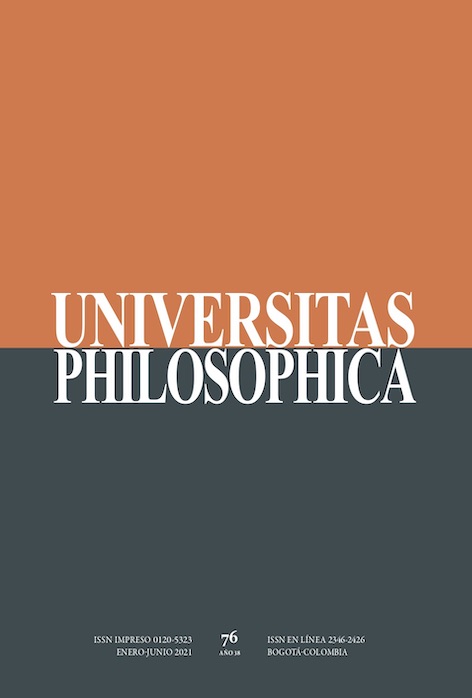Resumen
Este estudio versa sobre las alteraciones de ciertas ideas de la filosofía política aristotélica con ocasión de su cruce con la exégesis agustiniana de la doctrina cristiana, promovido por Tomás de Aquino en su Tratado sobre el reino (De regno). Lo que sigue es una revisión del lugar que le corresponde en la obra al carácter universal de la política, que en la filosofía de Aristóteles yacía ligado al naturalismo político y que en la recepción tomista parece proyectarse hacia un registro sobrenatural y divino. Para evaluar esta conjetura nos remitimos a las causas y fines atribuidos por Tomás al dominio del hombre sobre el hombre, intentando rastrear el lugar que ocupa la virtud política en el planteamiento. La hipótesis por sustentar es que la caracterización que hace Tomás del modelo político del reino implica una bifurcación en el fin hacia el que la comunidad política tiende, todo lo cual propiciaría la desuniverzalización de la política misma.
Agustín de Hipona (2010). La Ciudad de Dios (trad. S. Santamarca del Río y M. Fuentes Lanero). Madrid: Editorial Tecnos.
Arendt, H. (2003). La condición humana (trad. R. Gil Novales). Buenos Aires: Paidós.
Aristóteles (1994). Metafísica (trad. T. Calvo Martínez). Madrid: Gredos.
Aristóteles (2015). Política (trad. G. Livov). Bernal: Universidad Nacional de Quilmes; Buenos Aires: Prometeo Libros.
Bertelloni, F. (2001). El uso de la causalidad en la reflexión política de fines del siglo xiii y principios del xiv. En: A. Borón (ed.), Teoría y filosofía política. La recuperación de los clásicos en el debate latinoamericano (pp. 56-78). Buenos Aires: Clacso.
Bertelloni, F. (2005). ¿El destino del Estado, coincide o no con el de sus dioses? Anales de Historia Antigua, Medieval y Moderna, 37(38), 107-133. doi: 10.34096/ahamm.v37.3513
Bertelloni, F. (2010). La teoría política medieval entre la tradición clásica y la modernidad. En: Roche Arnas, P. (coord.), El pensamiento político en la Edad Media (pp. 17-40). Madrid: Fundación Ramón Arces.
Dotti, J. (1994). Pensamiento político moderno. En: E. de Olaso (ed.), Enciclopedia Iberoamericana de Filosofía, 6. Del renacimiento a la Ilustración I
(pp. 53-76). Madrid: Trotta, Consejo Superior de Investigaciones Científicas.
Habermas, J. (1987). Teoría y praxis: estudios de filosofía social (trad. de S. Mas Torres y C. Moya Espí). Madrid: Tecnos.
Magoja, E. (2019). La transformación conceptual del modelo político clásico del Estado en Tomás de Aquino. Díkaion, 28(2), 333-354. doi: 10.5294/dika.2019.28.2.5.
Strauss, L. (2000). Derecho natural e historia (trad. Á Leiva Morales y R. Da Costa García). Barcelona: Círculo de Lectores.
Tomás de Aquino (2003). Del reino (trad. A. Tursi). Buenos Aires: Editorial Losada.
Tursi, A. (2003). Introducción y notas. En: Tomás de Aquino, Del reino (pp. 51-58). Buenos Aires: Losada.
Ullman, W. (1985). Principios de gobierno y política en la Edad Media (trad. de G. Sotiano). Madrid: Alianza Editorial.

Esta obra está bajo una licencia internacional Creative Commons Atribución 4.0.
Derechos de autor 2021 Rafael Esteban Gutiérrez Lopera


